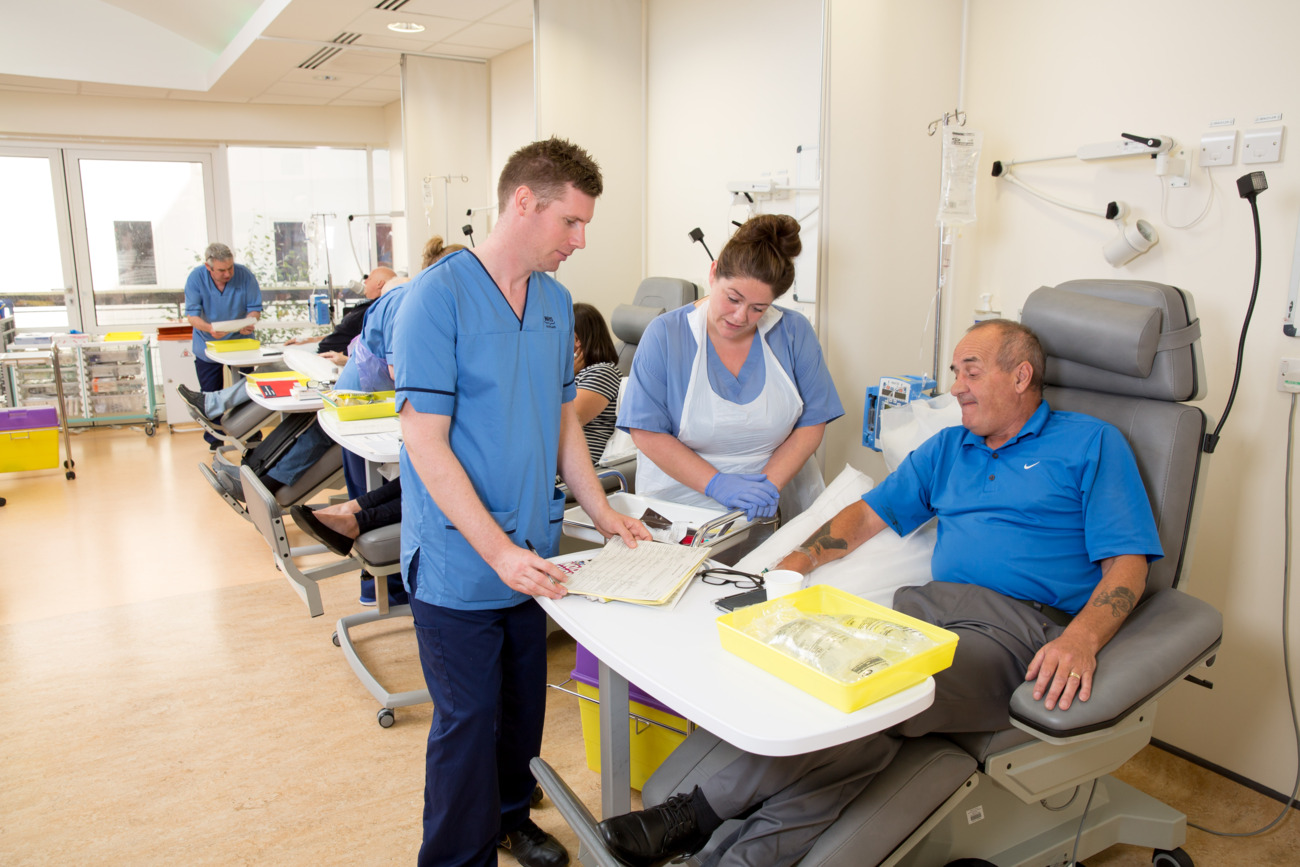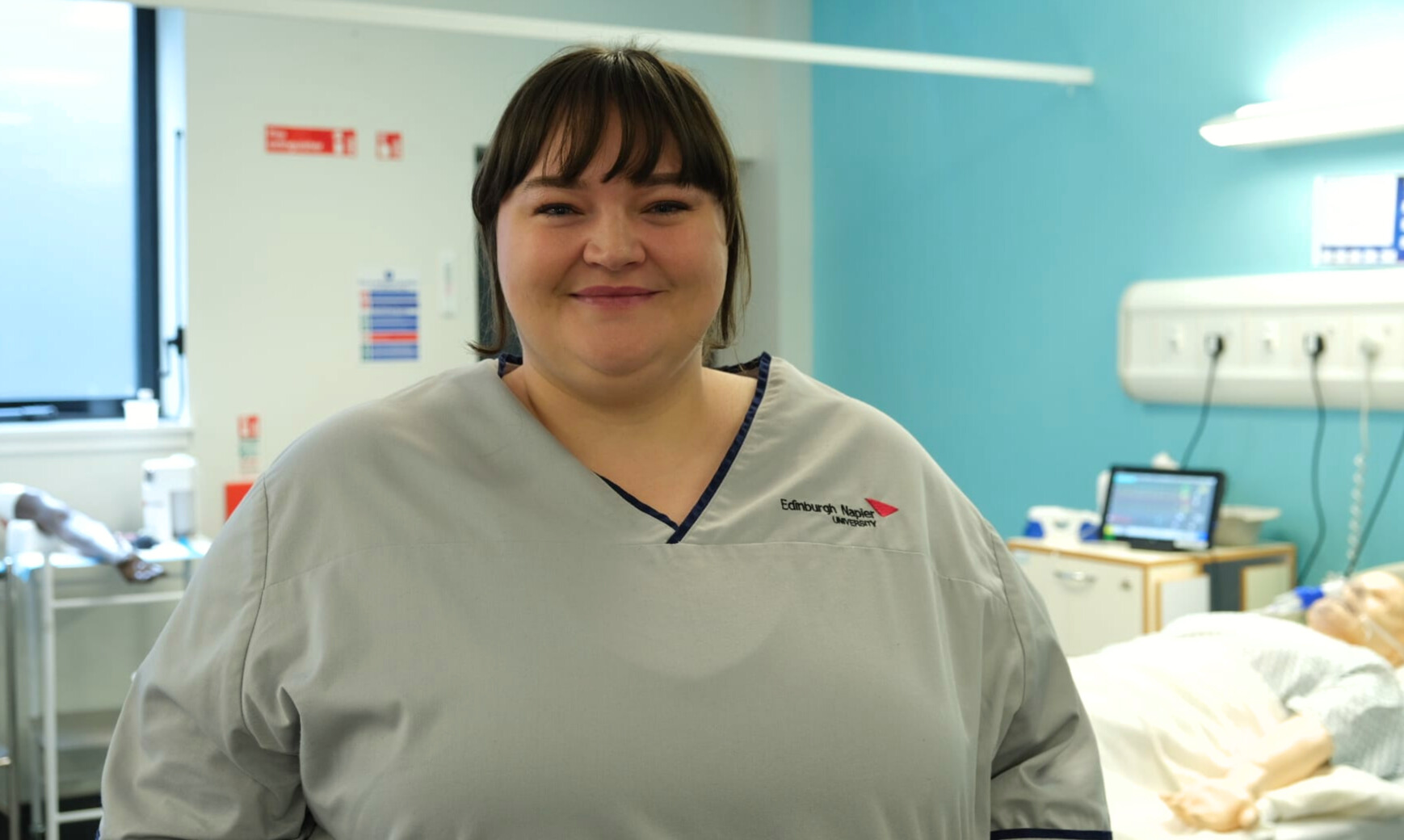Previous
Nursing
To become an adult nurse in the NHS, you'll need to complete a pre-registration degree programme accredited by the Nursing and Midwifery Council (NMC).
In the NHS an adult nurse has the specialist knowledge and skills to provide care to adults from the age of 18 onwards. Adult nurses use a wide range of skills to influence, deliver, plan and assess a person’s care and treatment. They play a vital role in empowering patients to make informed decisions about their care and wellbeing.

The entry requirements for a degree in adult nursing can vary across universities and colleges. Useful subjects include:
Speak to your guidance teacher or careers adviser about subjects offered at your school.

You may find it helpful to get some healthcare experience by doing a work placement or volunteering. You will get training, increase your knowledge, and learn new skills. This could help you when applying to college, university, or a new job with NHSScotland. Contact your local health board to find out about the work placements or volunteering opportunities available to you.
There are many different routes to becoming a registered adult nurse. Find out the best way for you below.
Apply for an adult nursing degree if you have the relevant qualifications, regardless of age. You could be a school pupil, college student, career changer, or an adult learner. Degree programmes take 3 years full-time.
You'll gain a nursing degree from an NMC-accredited university. When you graduate, you'll become a qualified nurse eligible to register with the NMC. As a newly qualified nurse, you can then apply for adult nursing roles in the NHS.
There are 10 universities in Scotland that offer undergraduate programmes in adult nursing, approved by the NMC:
Search for pre-registration undergraduate nursing degree programmes on My World of Work.
The Open University offers options to support the career development of nursing support workers.
If you're a nursing support worker, the CertHE in Healthcare Practice at SCQF level 7 will help you develop your knowledge and understanding and learn the practical and professional skills to:
This nationally recognised qualification includes online study and supervised practice in your workplace.
Find out more about the CertHE in Healthcare Practice with the Open University.
The Open University offers a 4-year part-time undergraduate adult nursing degree programme at SCQF level 10. You'll combine working in your existing nursing support worker or assistant practitioner role with online study. The distance learning approach includes local placements to provide hands-on experience and training.
The Scottish Government covers all tuition fees.
Find out more about Open University nursing degrees.
The Scottish Wider Access Programme (SWAP) is for adult learners who have been out of education for 3 years or more.
The SWAP pathway offers a supportive route that you can take to re-enter education and pursue a career in nursing. The one-year course will help to bridge gaps in your education.
Completing this pathway will prepare you for entry into a SWAP partnered university undergraduate nursing degree programme. Tuition fees and a bursary may be available.
You can apply for a Higher National Certificate (HNC) in Healthcare Practice if you are an existing healthcare support worker or you do not have the necessary qualifications for direct entry into an undergraduate nursing programme. This pathway is a stepping stone towards a nursing degree.
Successful completion of the HNC programme may allow direct entry into the second year of an undergraduate nursing programme. It could accelerate your progress towards becoming a registered nurse within NHSScotland.
Taking one year to complete, many colleges in Scotland provide the HNC Healthcare Practice qualification.
Colleges that offer the course include:
Search for college courses on My World of Work.
To be eligible for the post-graduate pathway, you'll need an undergraduate degree in any subject. The course takes 3 years to complete.
During this full-time course, you will split your time between on-campus learning and placements in hospitals and community settings.
There are 3 universities in Scotland that offer a pre-registration post-graduate programme in adult nursing:
Search for pre-registration postgraduate nursing degree programmes on My World of Work.
If you were previously registered with the Nursing and Midwifery Council (NMC), the return to practice pathway is right for you. You’ll need an NMC statement of entry confirming your previous registration.
You'll also need to meet the NMC's practice hours requirements before you start your readmission application.
If you're unable to meet the practice hours requirement, you can complete one of the following to update your knowledge and skills:

The Paramedic, Nursing and Midwifery Student Bursary (PNMSB) scheme is managed by the Student Awards Agency Scotland (SAAS) on behalf of the Scottish Government.
It includes a non-repayable bursary of £10,000 that’s not income assessed.
You must meet the eligibility criteria:
Other bursaries or grants may be available depending on your circumstances.
An adult registered nurse is a key member of the healthcare team. They deliver direct care and support to people and their families. As an adult nurse you'll be a decision maker for complex clinical decisions in a healthcare environment.
You'll be responsible for peoples physical, clinical and emotional needs. Working as an adult nurse is a rewarding career. Having people put their trust in you when they are at their most vulnerable is a huge privilege.
Adult nursing is a varied profession with many different specialities. Depending on your role, you could:
Adult nurses have a vital role in helping people understand information about their diagnoses, treatment, and health.
As an adult nurse, you're a highly skilled professional who has responsibility for the decisions you make within your role.
Your main tasks could include:
As well as being caring, empathetic and compassionate, adult nurses develop and use the following skills:
As an adult registered nurse, you will need to be able to review clinical information and make decisions about care.
Adult nurses usually work in a team with other health and social care professionals. They often work in public facing roles, and with other professions, including:
As an adult registered nurse the NHS, you could work in:
Adult registered nurses can also work in the care sector, independent healthcare sector, education, industry, and the military.
When you become qualified, you must register with the Nursing and Midwifery Council (NMC) to practise as an adult nurse. The NMC are the independent regulator for all registered nurses and midwives in the UK.
This video from the NMC explains what makes you a registered professional.
Once registered as an adult nurse, there are ongoing requirements for education and skills development. You’ll have opportunities to further develop in your career.
In your first year as a newly qualified nurse, you’ll get extra support and guidance through the Flying Start NHS programme.
In the NHS, you may choose to be a staff nurse throughout your nursing career, keeping up to date through continuing professional development. Taking extra courses and workplace learning could lead to progression through the career pathway to senior, advanced, or consultant level.
When you have qualified and gained experience as a registered adult nurse, there are lots of specialisms to choose from, including:
Revalidation is a process that all nurses need to follow to maintain their registration with the NMC every 3 years.
It is an ongoing process throughout your career as a nurse and aims to:
When you become a qualified adult nurse, you must register with the Nursing and Midwifery Council (NMC) to work in the NHS. You can also join the Royal College of Nursing.

Discover the skills and qualifications you’ll need for each role and what the work will be like.
Explore careers
We'll guide you through the recruitment process, from applying online to interview preparation.
Help with recruitment